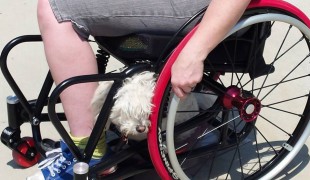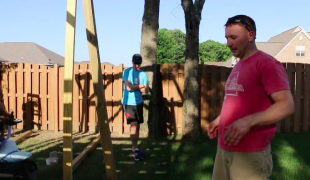- 4130
- 263
- 3
- 3
- 0
- Help Ukraine
About the solution
Bill McManus is an assistant in a special-needs classroom, after remembering the isolation that kids with disabilities can experience, he thought about modifying a chair so that these kids could also be included. He was inspired by an 8th-grade girl confined to a wheelchair watching her classmates enjoying and having fun during the P.E. class.
“I watched her watching them,” McManus said. “I thought ‘Wouldn’t it be great to modify a chair of some sort so that when the other kids were doing P.E. or running laps, some of them could volunteer to help pull these other kids around? To help them be engaged and involved with the other students?”
McManus conceived the idea of the Wheel Chariot in 2015. The Wheel Chariot is a uniquely equipped wheelchair that allows disabled passengers to be towed by and to communicate with their non-disabled classmates.
“I thought it would be great to engage the kids by forming a Makers Club, and running it like a company,” McManus said. “We’d give them experience, show them how to use manufacturing, marketing and give them a little taste of all the different elements involved when a company develops a product.”
By 2016, the Makers Club decided to tackle the idea of a student-powered mobile chair. “The school has a couple of wheelchairs that were out-of-date, so we got one and looked at how we could take pieces of PVC piping and hook things together,” McManus recalled. “The kids decided how best to do it; some thought it would be best to push, while others to pull.”
When the first version of the chair was ready, Blake, 13, suffering from Angelman’s syndrome was one of the first riders. Blake has a genetic condition that can cause a range of symptoms, including developmental delay, speech impairment and seizures.
“Everybody was a little nervous, but I thought it was amazing,” Blake’s mum said. “I cried, to be honest. It was surreal to watch other kids help with him and enjoy that … All he does in it is laugh, and his laugh is contagious.”
After the first version, the Makers Club began working on including an Augmentative Alternative Communication device to the chair that would allow non-verbal riders to push buttons to tell pullers ‘Go’, ‘Stop’, ‘Thank you’, and ‘High five’.
Funding for the project came from the government and small grants from local clubs.
The Wheel Chariot project and its creators were honoured with a Dreammakers and Risktakers Award presented by the Innovation Tri-Valley Leadership Group in 2017.
“What we find remarkable about this project is the students helping students. These students pushed beyond what the classroom offers them to go above and beyond to help their friends. Bill’s role was key, but the kids themselves were eager to do this,” said district Director of Community Engagement Philomena Rambo.
Adapted from: https://www.eastbaytimes.com/2017/09/10/modified-wheelchair-created-by-s...
This solution shall not include mention to the use of drugs, chemicals or biologicals (including food); invasive devices; offensive, commercial or inherently dangerous content. This solution was not medically validated. Proceed with caution! If you have any doubts, please consult with a health professional.
DISCLAIMER: This story was written by someone who is not the author of the solution, therefore please be advised that, although it was written with the utmost respect for the innovation and the innovator, there can be some incorrect statements. If you find any errors please contact the patient Innovation team via info@patient-innovation.com
-
-
393
-
0
-
4945

Stepfather develops custom wheelchair
MOVING IN A WHEELCHAIR: Moving using a wheelchair.
Playing
Spinal Cord and Nerve Root Disorders
Cerebral Palsy
Neuromuscular Disorders
Meningomyelocele
Walking Aid (wheelchair/walker/crutches)
Muscle cramps or spasms
Difficulty coordinating movements
Stiffness or rigidity (difficulty moving)
Muscle weakness
Restoring mobility
Managing Neurological Disorders
Promoting inclusivity and social integration
Caregiving Support
Medical Genetics
Neurology
Pediatrics
United States
-
-
-
831
-
0
-
18002

Proloquo2Go – App to help people communicate
CAREGIVING
COMMUNICATION: Communicating, whether by speaking, listening, or other means
Social interaction
Paralysis
Autism
Cerebral Palsy
Brain Stroke
Brain Injury (Abscess, Brain Barrier Defect, Brain Contusion, Brain Hemorrhage, Brain Edema)
Assistive Daily Life Device (to help ADL)
Assistive Technology access
App (Including when connected with wearable)
Tremors
Muscle cramps or spasms
Difficulty coordinating movements
Muscle weakness
Difficulty speaking or understanding speech
Trouble with fine motor skills (e.g., writing, buttoning clothes)
Twitching or involuntary movements (myoclonus)
Acquired language impairment (Aphasia)
Promoting self-management
Managing Neurological Disorders
Building Supportive Community Relationships
Promoting inclusivity and social integration
Improving Speech and Communication
Caregiving Support
Clinical Pathology
Medical Genetics
Neurology
Pediatrics
Rheumatology
Netherlands
-
-
-
622
-
1
-
12734

Swing for wheelchair users
CAREGIVING
MOVING IN A WHEELCHAIR: Moving using a wheelchair.
Playing
Muscular Dystrophy
Neuromuscular Disorders
Cervical spinal cord injury/Tetraplegia
Walking Aid (wheelchair/walker/crutches)
Strategy/Tip
Difficulty coordinating movements
Paralysis of the legs and lower body
Muscle weakness
Caregiving Support
Medical Genetics
Neurology
Pediatrics
United States
-
 en
en